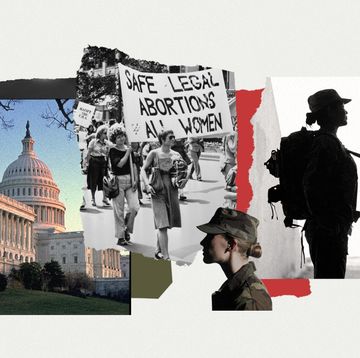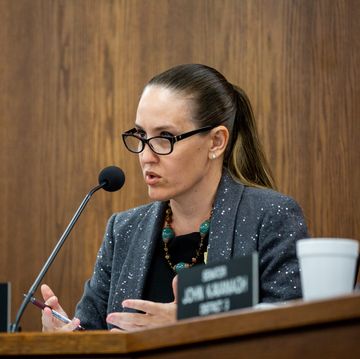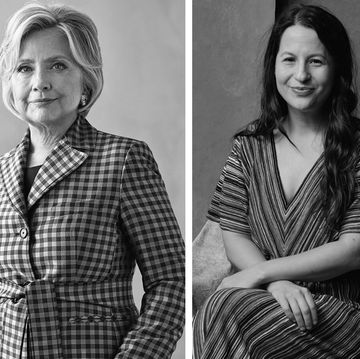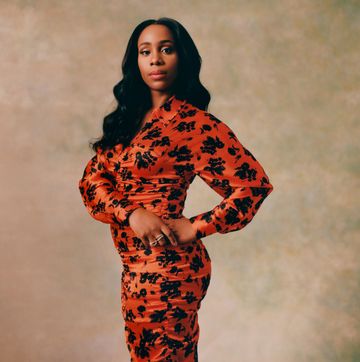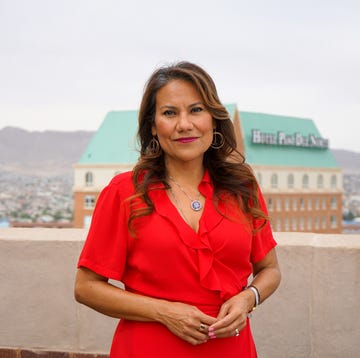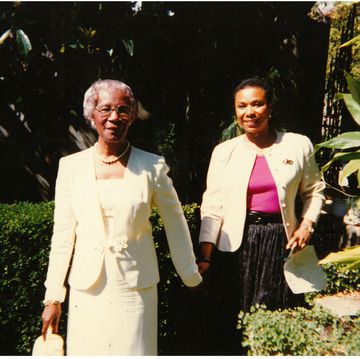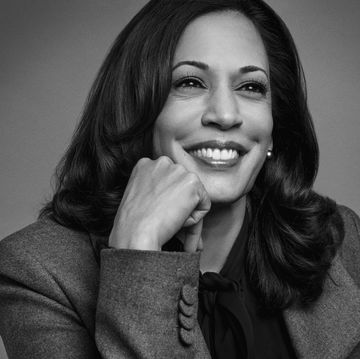Sometime around 2007, long before the triumph of Argo, Ben Affleck was in the midst of a hard-fought and by no means certain comeback. Having been tarred in the tabloids and weathered a series of stunning flops, Affleck had carefully charted his path to redemption: taking smaller roles in less commercial films and reinventing himself as a writer-director who would finally deliver on the promise of Good Will Hunting with a directorial debut, Gone Baby Gone, in the wings. But he wanted more than that, too. A savvy Dem who'd campaigned for Gore, then Kerry; who was a vocal early supporter of gay marriage; who told GQ as far back as 2001 that he hoped to be wealthy enough one day to run for Congress without being beholden to any special interests—Affleck wanted to do something big. "I got to a point where I felt like, I'm living this kind of vacuous life, I'm kind of living for myself," he has said of that time. "I'm chasing some idea or some goal. But I didn't know what my values were; I didn't know what I was contributing to the world." And when you're an alpha-male movie star with deep pockets and a desire to prove yourself, merely signing a check isn't the contribution you're looking to make.
But giving is hard. Especially when you have a lot to give. With philanthropic work inching ever closer to the top of the modern celebrity CV, Hollywood is littered with well-intentioned (and less so) charitable snafus. For every successful Angelina Jolie field mission to Sierra Leone or Matt Damon–sponsored well in Africa, there's a Madonna Malawi embarrassment (her charity collapsed after spending $3.8 million on an uncompleted school in Malawi—much of the sum deemed by auditors as "outlandish expenditures"). Or a Wyclef Jean: His "Yele Haiti," founded after the 2010 earthquake, raised $16 million in donations but spent only $5.1 million on disaster relief. It doesn't even take a major initiative to create a major backlash. In 2011, when Hilary Swank accepted a (paid) invitation to toast the birthday of Chechen president Ramzan Kadyrov, she found out only afterward about his monstrous human rights record. Blasted in the worldwide press, Swank fired two agents and her manager. She said it all when she told Jay Leno, "Shame on me. The bottom line is, I should know where I'm going and I should do better research."
With both a renewed reputation and abiding political aspirations at stake, Affleck needed someone who could do more than point him in the right direction. He'd read about the violence in Western Sudan; about the unimaginable death toll in Central Africa and the Democratic Republic of Congo that was going virtually unnoticed in the U.S. To tackle something like that, he needed a philanthropic powerhouse. Staffers at Bono's charity ONE knew just whom to steer him toward: Whitney Williams.
Around Hollywood, the word on Williams is that she's a nonprofit warrior, a political animal in heels. She's traveled overseas with Bill and Melinda Gates, consulted on Damon's Water.org (Williams and Damon first met on a tarmac in Tanzania), and worked for Hillary Clinton during her time as first lady. And for 10 years, Williams has run Seattle-based consulting firm williamsworks, helping brands and boldface names harness their fame, cash, and influence to do serious good—including, in 2006, memorably executing a nine-day, seven-country tour of Africa for Bono and Bobby Shriver.
Williams, 42, also happens to be discreet to the point of elusiveness. She almost never gives interviews. Her name doesn't turn up much on Google. In fact, though she cofounded the Eastern Congo Initiative (ECI) and has run it alongside Affleck since 2010, her name is hard to find on the organization's website. It's a good thing Affleck is happy to do the bragging for her. "From [arranging for] prop planes in South Sudan to getting us into a country in the middle of a war, I have seen Whitney work miracles," he says. "And she's a hell of a lot braver than I am. She's just one of those rare people—exceedingly smart, worldly, experienced, assertive, canny, diplomatic, tough, ingenious, kind, and doesn't fuck around, not even for a second. If my daughters turn out half as great as Whitney, I will be thrilled."
Even after agreeing to an interview with ELLE, Williams played hard to get. I was scheduled to observe her in action in June, at the first joint fundraiser of ECI and the Clinton Foundation, an intimate affair at superagent Patrick Whitesell's house, featuring a performance by Eddie Vedder. But 48 hours prior, Williams rescinded my invitation, citing privacy concerns. When a one-on-one dinner for us was arranged for a few weeks later at a farm-to-table restaurant in Venice, California—she was in town working with Blake Mycoskie, founder of shoe company Toms—I sat down and ordered a glass of wine. But I knew there was a good chance I'd be dining alone.
Forty minutes after we were scheduled to meet, Williams arrived: tall and lean, with shoulder-length brown hair and wearing a sleek, body-hugging printed dress. Once again, she'd overscheduled herself, she explained, ordering a glass of rosé. I have to ask: Why all the chase?
"I'm not an introvert," she says, "but I've been very careful about not being seen as someone who is about themselves. I don't like to talk about myself."
That Williams is reticent by nature is funny, considering her life story is essentially one long cocktail-party anecdote, complete with an odd family tree (Evel Knievel is her cousin) and wicked tales of adventure. (Says Affleck: "The only thing I know that she does to unwind is climb mountains—which is about the least unwinding thing I can think of.") Last year, she spent just 12 nights at home in Seattle; she struggles to keep her lone plant, "Pete"—a gift from Evel Knievel's mom—alive. "Pete can live for a month."
Williamsworks' staff of 16 is currently working on projects with Nike and the Somali rapper (and global superstar) K'naan. With Toms, the company is plotting an initiative to end podoconiosis, an elephantiasis of the feet caused by an irritant in the red clay soil of Ethiopia. Running ECI with Affleck—work Affleck has called "the thing I most respect" in his career—is Williams' second full-time job.
The pair took no fewer than six trips to West Africa—Williams calls the training "Ben's PhD"—before deciding where to commit their energies. "Congo was wracked with a terrible conflict, a preventable health crisis, more than a million displaced people, and a nearly completely dysfunctional security sector," Affleck says. "I couldn't imagine a place where one's efforts could go to more good—or where help was more urgently needed."
The region has no easy-to-understand narrative, no cut-and-dried story of good guys versus bad guys, which makes fundraising difficult. The nation has been unable to stabilize following two major wars fought in succession between 1996 and 2003, in which eight African nations fought on Congolese soil and 4 million Congolese died—roughly twelve times the death toll of the war in Darfur. The violence stems from an unfortunate convergence of colonialism and a U.S.-backed government in the '60s, which created a host of problems, not to mention fallout from the genocide in Rwanda (Hutu fighters who escaped into Congo continue to wreak havoc, and weapons keep pouring in from Rwanda, despite a UN embargo). Though Congo now has free elections, they're riddled with controversy. Chronic malnutrition afflicts nearly 45 percent of the nation's children. A former UN official called Congo "the rape capital of the world."
Summing up ECI's battle, Affleck says plainly: "Imagine a grant-making organization working with local Congolese organizations trying to function in a war zone." The mission is twofold: raising cash for organizations already on the ground—including Children's Voice, a school that offers free educational and vocational training to kids in extreme poverty, and Dynamique de Femmes Juristes, a group that provides free legal aid to victims of sex crimes—and, on the home front, applying strategic pressure in Washington.
An ECI-funded white paper outlining the history and prospects of the region, coupled with the nonprofit's lobbying, led in part to the Obama administration's commitment of $271 million to Congo in 2012. The State Department also just named Wisconsin senator Russ Feingold a special envoy to the region, sending the message that DC has the DRC in mind. Feingold, who calls the violence and instability in Congo "one of the greatest tragedies in the world," says, "Ben's group and the people involved are one of the few who are really helping make it obvious to the American public that this requires our attention."
Asked to quantify Affleck and Williams' role in ramping up the government's commitment to Congo, Rajiv Shah, administrator of the U.S. Agency for International Development, says, "They've been in to see the president, the secretary [of state]. Their efforts have made a huge difference." Of Williams, whom he's known for almost 10 years, Shah says with a smile, "She's relentless."
The results are being felt on the ground, too. "It is still early, but there's real, tangible progress," Affleck says. "I spoke with a woman who endured the most unspeakable sexual violence, who was treated in a hospital we support and is seeking justice through a legal clinic we fund. To see her willingness to engage in life—to return to the world, to do job training and expose herself to a broad social life, despite the stigma attached to rape—was profoundly moving and humbling."
As for how the locals in Congo treat the Oscar winner, a kid without a TV doesn't know Affleck just signed on to play Batman. But when he sees a 6'4" white guy roaming the streets of Goma, that's remarkable. "It's just mzungu!" Williams says, which is Swahili (the lingua franca of East Africa) for "white guy." "It's 'Mzungu! Mzungu!' everywhere you go."
Williams grew up the youngest of three in a strong Democratic clan dubbed the "first family of Montana politics" by the local press. Carol Williams, her mother, was the first female majority and minority leader of the Montana Senate. Her father, Pat, served as the state's sole representative for nine terms. Every time a congressional seat opens up in her home state, Whitney's name is bandied about as a contender.
She studied political science at the University of Montana and got her start as an intern at the Clinton White House in 1993. Here's another of those cocktail-party stories: At the time, Clinton was engaged in a bitter fight over his budget proposal, and Williams' father was expected to cast one of the deciding votes. Sensing an opportunity, her superiors at the White House leaned on her to sway her father. "They were giving me the statistics," she says now, with a laugh. "I'd go home and cut them out and, like, tape them to Dad's shaving cream. Or the milk. I was lobbying full-time for the president." Williams voted yes. And the budget passed—by one vote.
After college, she worked on Hillary's book tour for It Takes a Village, then parlayed that into an enviable full-time position as the first lady's trip director. "I ran the road show," Williams says of a job that required orchestrating visits to 43 countries. (She's also traveled to an additional 29.) Bill Clinton even set her up on a date during a 2008 campaign stop for Hillary in Montana. A 6'5" blond, blue-eyed environmental lobbyist shouted out to Clinton, "Sir, can you do me a favor?" The president's curiosity was piqued. "Can you get me a date with Whitney Williams?" For the record, Clinton did, but it wasn't a match.
Williams tells that story with a perfect mix of aw-shucks embarrassment and knowing charm, the same way she tells me about the time she cold-called Bill Gates and the man himself answered the phone. (The Bill & Melinda Gates Foundation became williamsworks' second client.) Sitting across from her over dinner, it's easy to imagine how good Williams is at working a room—how, in ECI's first round of funding three years ago, it wasn't just Affleck who wrangled benefactors such as Laurene Powell Jobs, Steve's widow, along with Google and the Howard G. Buffett Foundation.
Early on, Williams and Affleck also reached across the aisle to Cindy McCain, who has a long history of philanthropic work in Africa. An ECI founding member, McCain has traveled to Congo often with Williams. "I've encountered—and I know she has too—what I call the eyes-glaze-over look," McCain says. "You start talking about Africa and people zone completely out. In their minds, it's hopeless. That could not be further from the truth. Her ability to gain the respect of folks like Ben who have the star power to get attention to the areas that need it is something that I can't do."
If he sounds like a politician, well, that's what a lot of people have been talking about (again) lately. On Face the Nation last December, Affleck didn't rule out a Senate run, and Jennifer Garner recently said she wouldn't be surprised if her husband went into politics. As for Williams, she knows a good politician when she sees one: "People want Ben to run. I don't talk to him about that. But I'll say Ben would be an exceptional public servant because he is extraordinarily committed, incredibly smart. He's a problem solver, a strategist. He would be remarkable."
Williams' own political future is anyone's guess. For now, she seems to relish her tales of helicopter rides in developing countries. "There was a bit of trouble once with a single-engine plane caught in a storm cloud," she says, "and roadside checkpoints with AK-47s where you're like, Maybe this isn't the best place to be at this moment."
There will be an open Senate seat in Montana in 2014, and possibly one in the House, too. Williams admits she discussed those opportunities with Rahm Emanuel (still reading Beltway tea leaves, even in his current role as Chicago mayor) but says she's content where she is. Still, asked what far-flung location she'd like to visit next, Williams thinks about it for a second and says firmly, "I want to go to Montana."





